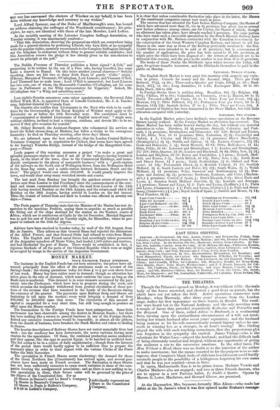Last night's Gazette announces some minor appointments: the Reverend John
Giffard Ward, MA., is appointed Dean of Lincoln Cathedral; Mr. J. A. Tasche- ream Solicitor-General for Canada Rut.
The Gazette also notifies that Lieutenants in the Navy who wish to be candi- dates for the Governorship of the Naval Knights of Windsor must apply at the Admiralty on or before the 10th November next. The candidates must be "superannuated or disabled Lieutenants of English men-of-war," "single men, without children, inclined to lead a virtuous, studious, and devout life: to be re- moved if they give occasion for scandal."
Mr. Sidney Bernard, the Assistant-Surgeon who volunteered his services on board the Eclair steam-sloop, at Madeira, has fallen a victim to his courageous humanity: he died on Thursday morning, after three days' illness.
We are informed, upon the best authority, that the London Central Railway Terminus Company are in negotiation for (indeed, that terms have been agreed to for leasing) Waterloo Bridge, instead of the bridge of the Ilungerford Coin- pany.—Times.
Leeds papers of this morning announce a project "to make a great and splendid passenger-station for most if not all of the railways having termini in Leeds, in the heart of the town close to the Commercial Buildings, and imme- diately contiguous to the place; of mercantile business," with a "goods-station of the railways on the South side of Wellington Street, from the Wellington Hotel to the Bean lug estate, and a cattle-station between Britannia Street and the river." The project would cost about 500,0001. It would greatly improve the town, and would clear away many wretched streets and courts.
The last mail from Bombay has brought the quickest return of answers to letters sent from London to that Presidency since the commencement of the over- land and steam communication with India; the mail from London of the 24th July having reached Bombay on the 24th August, and the return-mail which left Bombay on the 28th August, having arrived in London on the 3rd instant. Thus the transit of letters from and back to London was effected in seventy-one lays.—Times.


























 Previous page
Previous page